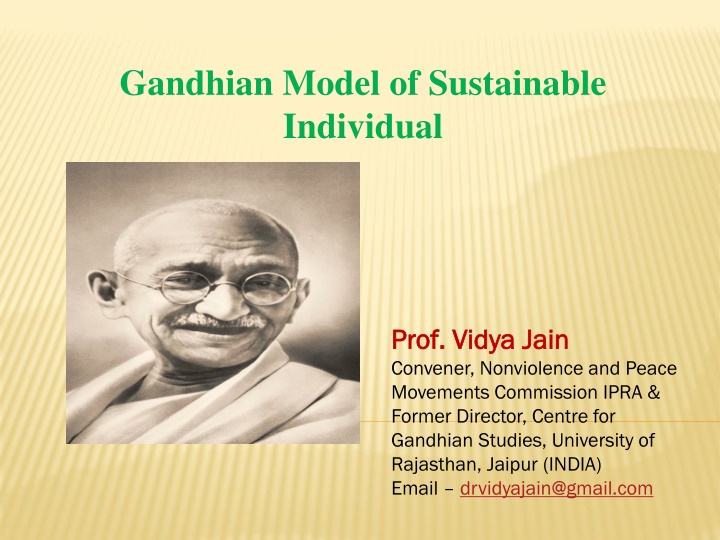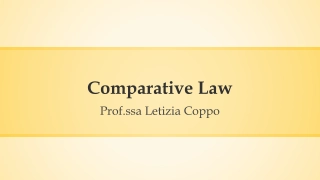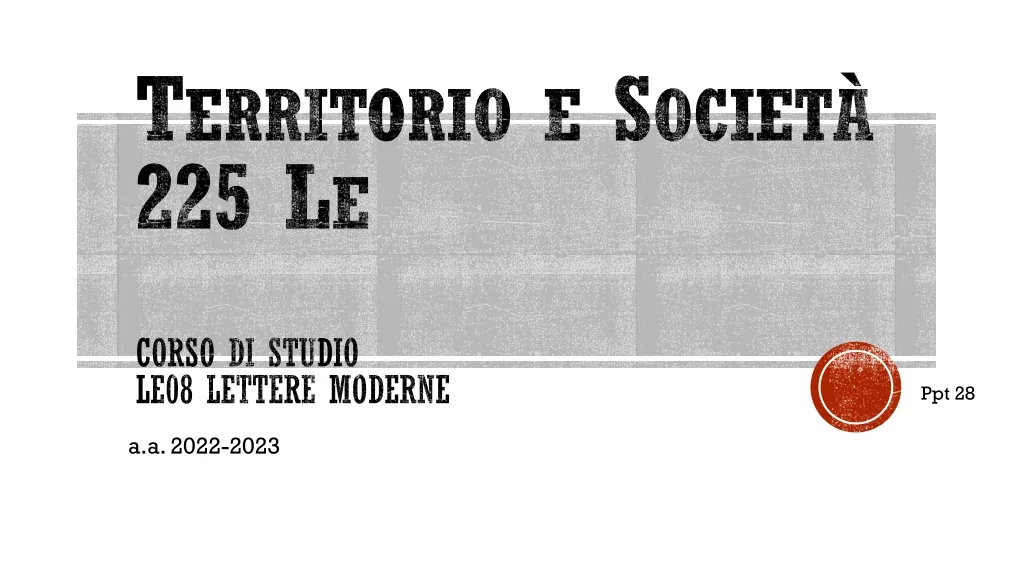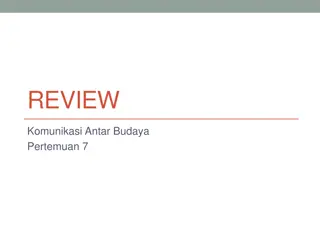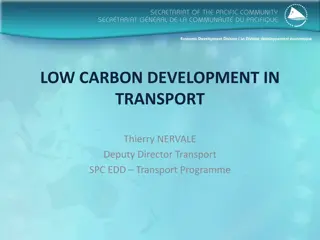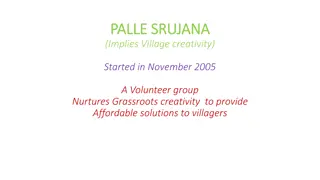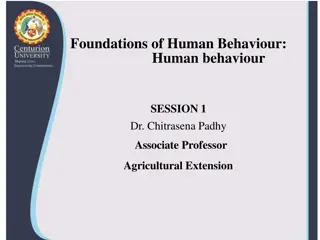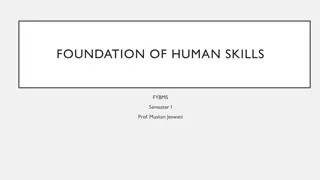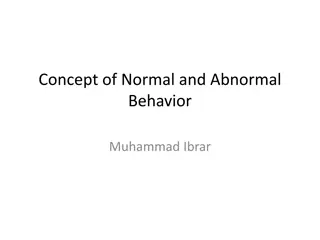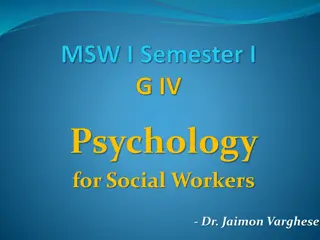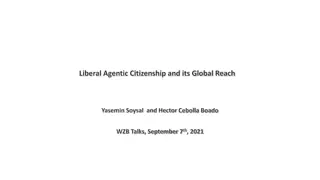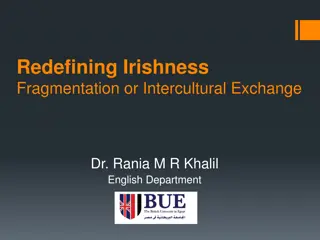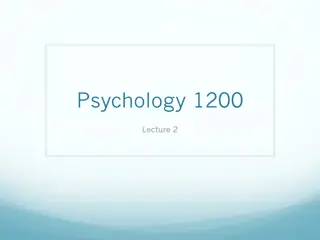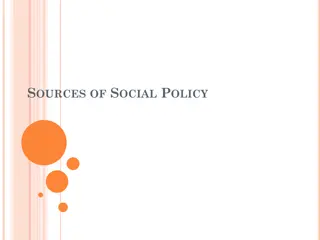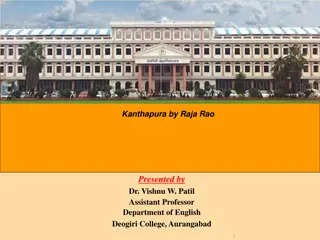Gandhian Model of Sustainable Individual Behavior in the Globalized World
The Gandhian model of sustainable individual behavior, as advocated by Prof. Vidya Jain, emphasizes nonviolence, peace, and harmony in a world plagued by globalization, conflicts, and intolerance. Drawing on Gandhi's principles from Hind Swaraj, the paper explores how fostering nonviolent societies at the individual level can pave the way for a more egalitarian and ethical society. It highlights the need to move towards a socio-economic order based on moral and ethical grounds rather than materialistic pursuits.
Download Presentation

Please find below an Image/Link to download the presentation.
The content on the website is provided AS IS for your information and personal use only. It may not be sold, licensed, or shared on other websites without obtaining consent from the author.If you encounter any issues during the download, it is possible that the publisher has removed the file from their server.
You are allowed to download the files provided on this website for personal or commercial use, subject to the condition that they are used lawfully. All files are the property of their respective owners.
The content on the website is provided AS IS for your information and personal use only. It may not be sold, licensed, or shared on other websites without obtaining consent from the author.
E N D
Presentation Transcript
Gandhian Model of Sustainable Individual Prof. Vidya Jain Prof. Vidya Jain Convener, Nonviolence and Peace Movements Commission IPRA & Former Director, Centre for Gandhian Studies, University of Rajasthan, Jaipur (INDIA) Email drvidyajain@gmail.com
BACKGROUND 20th century was the bloodiest century with two world wars and endless conflicts among individuals, communities, states and environment. The last decades of the century has put the humanity on the path of globalization, where intolerance, terrorism and wars are inherent. Globalization is dividing the already divided world. It is increasing the gap between rich and poor.
Globalization is concentration of power, wealth and knowledge in the hands of few. Globalization is neo-colonialism and is creating new slavery, new holocaust and new apartheid. It is a war of monocultures against diversity, of big against small, of technology against nature.
GANDHIS HIND SWARAJ : THE SEED BOOK oGandhi in as early as 1909 in his seed book HIND SWARAJ contradictions of consumerist life style, which are outcome of globalization. Gandhi could visualize the ills of this satanic civilization and came up with an alternative sketch of humane, non- exploitative and egalitarian society. Gandhi is relevant today as he was never before. highlighted the the materialistic- oGandhi sets a tone for building the society which is mainly based on moral and ethical grounds.
HARMONY : SEED THOUGHT Harmony Peaceful coexistence not only among living but nonliving things as well. Men, animals, birds, mountains, rivers, lakes all are mutually dependent. We are not in competition but in symbolic relation with each other. Life on earth is not a fight for survival rather earth nurtures life.
The objective of this paper is to explain briefly the major ideas of Gandhian individual which can serve as the foundation of a non violent social order. Gandhian model of individual behavior has greatest potential to bring a socio-economic order for moving towards non- violent societies. Gandhian macro model of society is consistent with the micro model he sets for the individual. 6
The modern life all around the world is becoming increasingly characterized by the lack of concern or feeling for others, alienation, anger, restlessness, hatred, aggression and absence of inner and outer peace and happiness. The suicides, fratricides, torturing, assaulting, raping, street wars, terrorist massacres, communal homicides, wars between nations, destruction of environment, ecology and nature, extinction of the spaces and species of flora and fauna are but only a few glaring examples of the present violent state of human society.
Gandhi was firm about his Individual because he was arguing a case for non-violent societies. A self regulated individual according to Gandhi, could contribute best to a non-violent society, because there would be least opportunity to govern, Gandhi stood for minimalstate . Minimal state is possible in his scheme only when individuals are liberated by high degree of self-regulation and are thus disciplined. 8
Gandhi sets a code of conduct for the sustainable Individual. Practice of this conduct for living and interacting with others at micro level would answer main problems at macro level relating to insatiable aggregate demands, abnormal profit appropriations and ecological disasters. monopolistic practices,
Gandhi developed a set of values to regulate individual life, which if strictly followed has a potential to improve the quality of life substantially. Such an individual would be very strong and have potential to create a just, humane and sustainable society. These sets of values are known as Ekadash Vratas ( Eleven Vows), Vratas means a vow, promise, resolve, religious act of devotion or austerity, law, rule or an ethical principle. 10
TRUTH SELF - RELIANCE NONVIOLENCE EQUALITY OF RELIGIONS CHASTITY ELEVEN VOWS CONTROL OF THE PALATE BREAD - LABOUR NON-OBSERVANCE OF UNTOUCHABILITY NON-STEALING NON-POSSESSION
TRUTH Truth was God to Gandhi. I believed that God is Truth" he wrote once, I now believe that Truth is God". His whole life was an experiment with truth. Truth is the only spiritual charter for free souls. It is the assertion of the dignity of man. This truth is not only truthfulness in words but truthfulness in thought and action also, and not only the relative truth of our conception, but the absolute truth, the eternal principle, that is God.
NONVIOLENCE NONVIOLENCE Gandhi interchangeably. All animate beings and inanimate things are bound by a cohesive force and that is love. Nonviolence is not only absence of violence or hurting any living being by evil thought, by undue hustle, by lying or hatred. Nonviolence is loving thy enemy and uplifting, transforming and elevating him. used nonviolence and love
CHASTITY According to Gandhi self-purification and self- regulation are very vital. Control of all senses in thought, words and deeds. It was Gandhi s considered opinion that sexual union was meant not for pleasure but for bringing forth progeny. Gandhi was great advocate of women s liberation. The congenial atmosphere for women s participation can be created if the vow of celibacy is observed.
ASWADA OR CONTROL OVER THE PALATE Taste buds are difficult to control or regulate. In controlling palate taste has to be completely sacrificed and nutritive food in limited quantity has to be consumed. ASTEYA OR NON-STEALING Acquiring or desiring to acquire something which does not belong to oneself is theft. Observance of non-stealing physically and mentally is compulsory.
APARIGRAHA OR NON-POSSESSION God never stores for tomorrow. According to Gandhi, the rich have superfluous store of things which they do not need, while millions are starved to death for want of sustenance. Possessions and richness comes in the way of seeking truth. Truth seekers have always been voluntarily poor. ABHAY OR FEARLESSNESS Freedom from deaths and delusions is fearlessness. A truth seeker and non-violent practicener is always fearless. Violence is display of one s own fear.
REMOVAL OF UNTOUCHABILITY As a shame on Hinduism and should be removed. BREAD BREAD- -LABOUR LABOUR If one does not do physical labor and eats, he is a thief. EQUALITY OF ALL RELIGIONS EQUALITY OF ALL RELIGIONS All religions ultimately leads to search of truth.
SWADESHI Think globally act locally Small is beautiful Less is more Keep you doors and windows open but be aware that you are not swept off you feet.
PEACE EDUCATION FOR INDIVIDUAL PEACE EDUCATION FOR INDIVIDUAL Realizing the importance of developing an integrated personality of the child, Gandhi evolved the system of Basic Education which aimed at developing not merely the qualities of head but also the qualities of heart and the hand through training in crafts. Today. there is more and more realization that along with science based education, there is need for value- oriented peace education at all stages for human sustenance. 19
In view of the explosion in information technology that has affected human life in all its aspects, care will have to be taken to see that modern methods and techniques of education are adopted and utilized not only for acquiring new knowledge but also for preserving all that is good and useful in the traditional value System. Gandhi and other well known educationists of the world agreed that the aim of education must be character building
Developing differentiating between right and wrong. Appreciating the importance of Love, Care and nonviolence. An ideal society as visualized by Gandhi is a harmonious community based on co-operation and mutual aid. Peace education is looked upon by the Mahatma as a means for the establishment of a society based on equality and social justice. wisdom and the capability of
Gandhi and other well known educators of the world agreed that the aim of education must be character building. Developing wisdom and the capability of differentiating between right and wrong. Appreciating the importance of Love, Care and nonviolence. An ideal society as visualized by Gandhi is a harmonious community based on co-operation and mutual aid. Peace education is looked upon by the Mahatma as a means for the establishment of a society based on equality and social justice. 22
In Gandhi's scheme of peace education creation of a new and integrated man wedded not to lesser loyalties of nation or community but to world peace and universal brotherhood. Gandhi offered an alternative life-style, alternative world vision and a viable set of strategies and methods for societal transformation, peace and stability by invoking the infinite power of nonviolence. 23
Both peace and environmental educators have a common goal of stopping violence, though in human communities there will always be conflicts. The challenge is to learn to resolve conflicts non-violently, to share limited resources equitably and to live within the limits of sustainability. New ecological thinking instinctively understands the holistic nature of peace and ecological education. It develops the ability to comprehend and analyze integrally the processes going on in the natural environment, taking into account the current political situation and economic situations. 24
To achieve peace and security, ecological education for peace and social responsibility must incorporate formal and non-formal learning opportunities. This approach highlights the value and benefit of participatory and experiential learning to enable children and youth to understand at a deeper level the integral dimensions responsibility and ecological security. of peace, social 25
The framework of peace education and its co- disciplines - including environmental and ecological education - introduces the emerging call for and acceptance of peace pedagogy that sees learning as a collective process aimed at empowering and creating agents of change. A sustainable human being can only build sustainable society. Practice of aswada (Control over Palate), asteya (Non-Stealing), aparigraha (being trustee to the wealth), physical labour and ahimsa
(nonviolence) and interacting with others at micro level would answer main problems relating to aggregate demands, monopolistic practices, abnormal profits and ecological disasters. Gandhian model of individual behavior has greatest potential to bring a just socio-economic order. How this individual behavior can be ensured? How individual redesigns his role as a change-maker and not just as a beneficiary of the development. This is possible only through radical change in education system on Gandhian lines.
The educational agenda should aim at creating culture of of peace peace in favour of life, personal realization, solidarity, happiness and harmony between human kind and nature. These programmes, methods and resources can be grouped under broad heading of peace education. culture different education This includes human rights, environmental education, security and disarmament, conflict resolution, critical media awareness, gender studies, world citizenship and above all Gandhian studies.
I want to emphasize the promotion of Gandhian studies at all levels. By furthering Gandhian studies a transformation in the mindset of young students is possible. A change in their character is bound to follow. These young students would be the peace soldiers, the green change makers of tomorrow. 29
